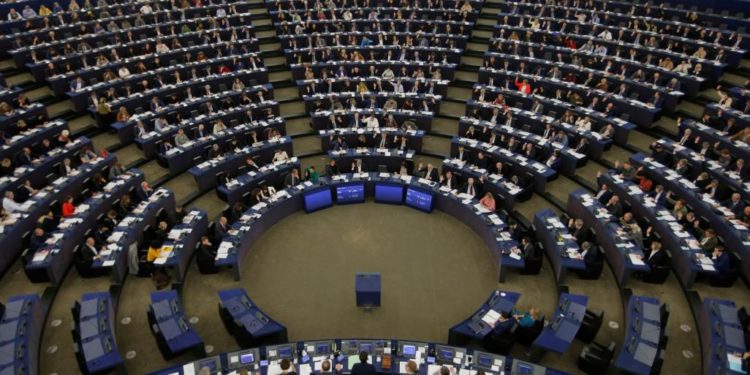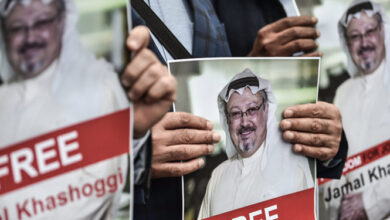EU Parliament condemns Saudi violations of prisoners of conscience rights

The European Parliament condemned the violations of the Saudi regime against prisoners of conscience in its prisons, against the backdrop of the death of prominent human rights activist Abdullah Al Hamed a few days ago.
The European Parliament, through its official website, offered condolences on the death of Al-Hamid.
“I was shocked to hear the death of one of the leading human rights voices in Saudi Arabia, who died in prison at the age of 69, when he was serving a 11-year prison sentence,” said Belgian lawmaker Maria Arena, chair of the Subcommittee on Human Rights.
“Al-Hamid devoted his entire life to fighting human rights violations, and protecting those who defend basic rights and freedoms in his country,” added Arena.
She criticized the authorities of the House of Saud, stressing that “denying the detainees medical care is a violation of the right to life and cruel, inhuman and degrading treatment.”
She emphasized that “medical negligence is not only morally incorrect, but an unacceptable act.”
She also noted that prominent activists and human rights activists in Saudi Arabia, including the Sakharov Prize Winner, Raef Badawi, were arrested only because they demanded peaceful change and their basic rights, including freedom of expression.
The Belgian representative called on the Saudi authorities to take the necessary steps to release the human rights defenders, especially in the midst of the crisis of the Coronavirus, warning against its arrival in the camps.
She also called on the authorities in the Kingdom to “take preventive measures and protect health without discrimination to protect detainees.”
Al-Hamid died last Friday, days after he entered a coma due to years of torture and medical neglect inside Saudi prisons.
The main idea that represents the title of Al-Hamid’s thought and project was: a constitutional monarchy, which allowed the people to choose members of the cabinet, through free elections, which the late considered a peaceful means that would enable the people politically, and would eliminate corruption inside the kingdom.
Al-Hamid criticized the approach of Sharia scholars in the Kingdom, which focuses on individual aspects such as issues of purity, acts of worship, etc., and omits civil and political rights, and Al-Hamid criticized algebraic tendency and the concept of “guardian overcoming” in Islamic jurisprudence heritage.
Al-Hamed called for what he called “civil jihad” through the establishment of civil society institutions, newspapers, satellite channels, and research, technology and media centers.
Al-Hamid considered that silence on political evils is one of the major sins and sins. At the same time, Al-Hamid considered that violence is not the solution, and that the effective remedy for this phenomenon is to allow peaceful political expression.
Al-Hamid’s first prominent contribution to legal and political work in Saudi Arabia was his participation in establishing the Committee for the Defense of Sharia Rights, with a large number of Saudi academics in mid-1993, after the outbreak of the second Gulf War.
Al-Hamed participated with many Saudi reform activists in the most prominent activities calling for constitutional political reform, through statements issued in 2003 with the signature of about 100 prominent Saudi personalities, in which they called for the transition to a constitutional monarchy, and to achieve separation of the three powers: legislative, executive and judicial, and the judiciary On government corruption.
In 2009 Al-Hamed co-founded the Saudi Society for Civil and Political Rights. In 2013, Al-Hamid participated, along with many prominent Saudi reformers, in signing a petition entitled “Seeing the Present and Future Nation,” calling for Saudi citizens to be given their basic rights and constitutional reforms, such as elections, the separation of powers, and the end of political arrests.
Al-Hamid was arrested and imprisoned by the Saudi authorities seven times, and the first time was on 15 June 1993 accompanied by 14 other academics who support the Shariah Committee for Rights and Reform.
After the release, Al-Hamed insisted on continuing his human and political activities, so he was arrested for the second time in 1994, and then arrested for the third time in 1995 after mentioning in one of his books that there is neither His Highness nor a friend of Dino in Islam.
On March 16, 2004, al-Hamid was arrested again with Saudi reformist figures. The last time al-Hamid was arrested was in March 2013, when he was sentenced to 11 years in prison and prevented from traveling 5 years after release, on the grounds that he tried to discredit the kingdom, veto allegiance with the ruler, and establish an unlicensed association.





